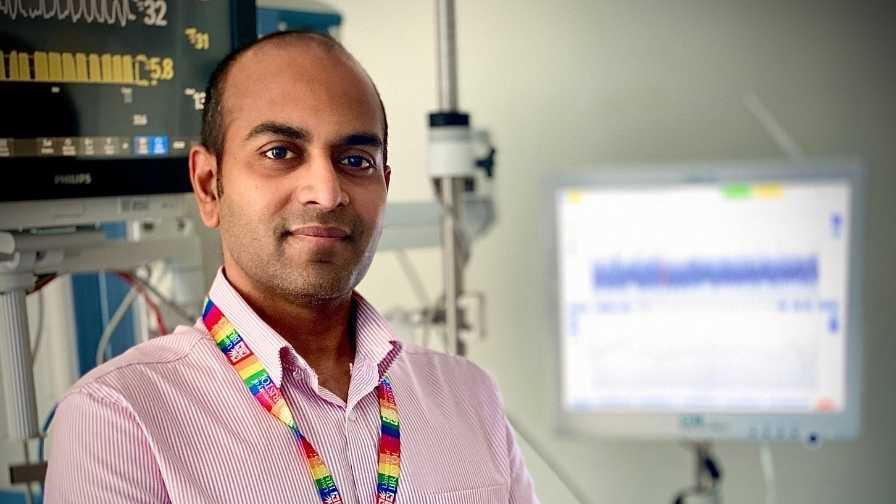Archived
Please note, this page may contain outdated information or subject matter.
It is known that exposure to certain viral infections shortly after birth or during pregnancy can impact a baby’s brain development or affect their development later in life, but it is not known if this is the case with SARS-CoV-2 infection. The SINEPOST (SARS-CoV-2 infection in neonates or in pregnancy) study, led by the University of Bristol in collaboration with researchers from the National Perinatal Epidemiology Unit (NPEU) at the University of Oxford, Imperial College London, and University of Leicester, aims to compare the impact of SARS-CoV-2 on the development of children who were exposed to the virus during pregnancy or shortly after birth to infants who have not been exposed to the virus.
Two hundred and fifty-seven infants have already been enrolled into the study, with recruitment ongoing until October 2022. The children will be followed up when they are 21 to 24 months old, with parents or carers being asked to complete questionnaires on how their child is developing.
The questionnaire will include the Ages and Stages Questionnaires (ASQ) used by professionals to monitor a child’s developmental progress; the Liverpool Respiratory Symptoms Questionnaire (LRSQ) which assesses patterns of wheezing and other respiratory symptoms in infants and preschool children; and additional questions about the child’s general health and use of health care services.
Most newborn babies infected with SARS-CoV-2 have mild or no symptoms, however they might be at risk of long-term effects. The SINEPOST study will add to what is already known about the impact of exposure to COVID-19, and increase our understanding of the short- and long-term impact of exposure in newborns.
Dr Ela Chakkarapani, Consultant Senior Lecturer in Neonatology at the University of Bristol Medical School says: “To understand the long-term effects on newborns who are exposed to SARS-CoV-2, we will assess how children develop when they grow using standard developmental questionnaires completed by parents. The results from our study will help inform guidance for pregnant women and new parents and also will help identify children who might need additional support. It will also stimulate research into new interventions to reduce the long-term impact of the virus on children’s lives.”

Dr Caroline Johnston, Senior Research Manager at Action Medical Research comments: “Action Medical Research has been at the forefront of funding pioneering research, including the research which led to the development of the polio vaccine. We understand the devastating impact that the COVID-19 pandemic has had on all people, particularly children. We are committed to funding research that ultimately will improve the health and wellbeing of children and young people.”
A study of 427 pregnant women admitted to hospital with confirmed SARS-CoV-2 infection between 1 March 2020 and 14 April 2020 found that the number with confirmed SARS-CoV-2 infection in pregnancy was 4.9 per 1000 pregnant women.[2] The UK Obstetric Surveillance System (UKOSS) and newborn infants (British Paediatric Surveillance Unit, BPSU) have also identified over 1,300 pregnant women and 100 newborn babies with confirmed SARS-CoV-2 infection up to August 2020.[3] [4],
-Ends-
About the University of Bristol
The University is ranked within the top 10 universities in the UK and 61st in the world (QS World University Rankings 2023); it is also ranked among the top five institutions in the UK for its research, according to analysis of the Research Excellence Framework (REF) 2021; and is the 3rd most targeted university by top UK employers.
The University was founded in 1876 and was granted its Royal Charter in 1909. It was the first university in England to admit women on the same basis as men.
The University is a major force in the economic, social and cultural life of Bristol and the region, but is also a significant player on the world stage. It has over 20,000 undergraduates and over 7,000 postgraduate students from more than 150 countries, and its research links span the globe.
For more information on Action Medical Research, please contact Grace Wardley, Communications and Engagement Officer:
T: 07725 090008
Follow us on Twitter at @actionmedres and @amr_events
Like our Facebook page at @actionmedres
Follow us on Instagram at @actionmedres and @actionevents
Action Medical Research is the leading UK-wide charity saving and changing children’s lives through medical research. For 70 years we’ve helped pioneer ways to prevent disease and develop treatments benefiting millions of people. Our research has helped to beat polio in the UK, develop ultrasound in pregnancy, fight meningitis and prevent stillbirths. But we urgently need to develop more new treatments and cures for sick babies and children and we can’t do it without you.
Join our fight for little lives today.
Charity reg. nos 208701 and SC039284
References
[1] Office for National Statistics, Vital statistics in the UK: births, deaths and marriages. https://www.ons.gov.uk/peoplepopulationandcommunity/populationandmigration/populationestimates/datasets/vitalstatisticspopulationandhealthreferencetables.
[2] Knight M et al. Characteristics and outcomes of pregnant women admitted to hospital with confirmed SARS-CoV-2 infection in UK: national population based cohort study. BMJ 2020;369:2107.
[3] Knight, M. et al. Characteristics and outcomes of pregnant women hospitalised with confirmed SARS-CoV-2 infection in the UK: a national cohort study using the UK Obstetric Surveillance System (UKOSS). BMJ 369, m2107 (2020).
[4] Gale, C. et al. National active surveillance to understand and inform neonatal care in COVID-19. Archives of Disease in Childhood-Fetal and Neonatal Edition 105, 346-347 (2020).
